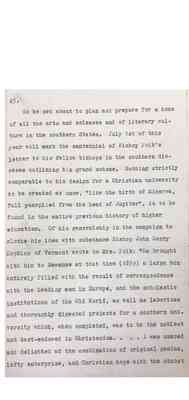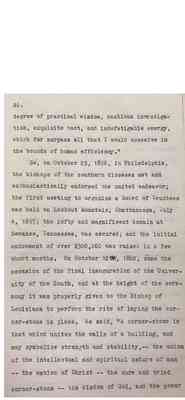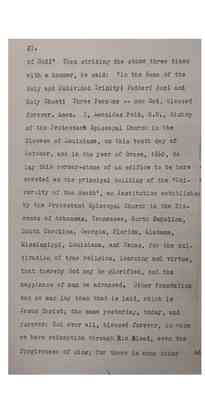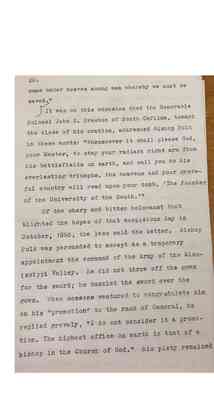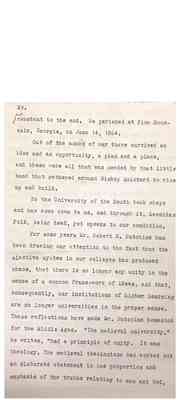Pages
26
-25-
So he set about to plan and prepare for a home of all the arts and sciences and of literary culture in the southern States. July 1st of this year will mark the centennial of Bishop Polk's letter to his fellow bishops in the southern dioceses outlining his grand scheme. Nothing strictly comparable to his design for a Christian university to be created at once, "like the birth of Minerva, full panoplied from the head of Jupiter", is to be found in the entire previous history of higher education. Of his generalship in the campaign to clothe his idea with substance Bishop John Henry Hopkins of Vermont wrote to Mrs. Polk: "He brought with him to Sewanee at that time (1859) a large box entirely filled with the result of correspondence with the leading men in Europe, and the scholastic institutions of the Old World, as well as laborious and thoroughly digested projects for a southern university which, when completed, was to be the noblest and best-endowed in Christendom.... I was amazed and delighted at the combination of original genius, lofty enterprise, and Christian hope with the utmost
27
-26-
degree of practical wisdom, cautious investigation, exquisite tact, and indefatigable energy, which far surpass all that I could conceive in the bounds of human efficiency."
So, on October 23, 1856, in Philadelphia, the bishops of the southern dioceses met and enthusiastically endorsed the united endeavor; the first meeting to organize a Board of Trustees was held on Lookout Mountain, Chattanooga, July 4, 1857; the lofty and magnificent domain at Sewanee, Tennessee, was secured; and the initial endowment of over $500,000 was raised in a few short months. On October 10, 1860, came the occasion of the final inauguration of the University of the South, and at the height of the ceremony it was properly given to the Bishop of Louisiana to perform the rite of laying the corner-stone in place. He said, "A corner-stone is that which unites the walls of a building, and may symbolize strength and stability, -- the union of the intellectual and spiritual nature of man -- the emblem of Christ -- the sure and tried corner-stone -- the wisdom of God, and the power
28
-27-
of God!" Then striking the stone three times with a hammer, he said: "In the Name of the Holy and Undivided Trinity! Father! Son! and Holy Ghost! Three Persons -- one God, blessed forever, Amen. I Leonidas Polk, D.D., Bishop of the Protestant Episcopal Church in the Diocese of Louisiana, on this tenth day of October, and in the year of Grace, 1860, do lay this corner-stone of an edifice to e here erected as the principal building of the 'University of the South', an Institution established by the Protestant Episcopal Church in the Dioceses of Arkansas, Tennessee, North Carolina, South Carolina, Georgia, Florida, Alabama, Mississippi, Louisiana, and Texas, for the cultivation of true religion, learning and virtue, that thereby God may be glorified, and the happiness of man be advanced. Other foundation can no man lay than that is laid, which is Jesus Christ; the same yesterday, today, and forever: God over all, blessed forever, in whom we have redemption through His Blood, even the forgiveness of sins; for there is none other
29
-28-
name under heaven among men whereby we must be saved."
It was on this occasion that the Honorable Colonel John S. Preston of South Carolina, toward the close of his oration, addressed Bishop Polk in these words: "Whensoever it shall please God, your Master to stay your radiant right arm from his battlefields on earth, and call you to His everlasting triumphs, the heavens and your grateful country will read upon your tomb, 'The Founder of the University of the South.'"
Of the sharp and bitter holocaust that blighted the hopes of that auspicious day in October, 1860, the less said the better. Bishop Polk was persuaded to accept as a temporary appointment the command of the Army of the Mississippi Valley. He did not throw off the gown for the sword; he buckled the sword over the gown. When someone ventured to congratulate him on his "promotion" to the rank of General, he replied gravely, "I do not consider it a promotion. The highest office on earth is that of a bishop in the Church of God." His piety remained
30
-29-
constant to the end. He perished at Pine Mountain, Georgia, on June 14, 1864.
Out of the ashes of war there survived an idea and an opportunity, a plan and a place, and these were all that was needed by that little band that gathered around Bishop Quintard to rise up and build.
So the University of the South took shape and has come down to us, and through it, Leonidas Polk, being dead, yet speaks to our condition.
For some years Mr. Robert M. Hutchins has been drawing our attention to the fact that the elective system in our colleges has produced chaos, that there is no longer any unity in the sense of a common frame-work of ideas, and that, consequently, our institutions of higher learning are no longer universities in the proper sense. These reflections have made Mr. Hutchins homesick for the Middle Ages. "The medieval university," he writes, "had a principle of unity. It was theology. The medievel theologians had worked out an elaborate statement in due proporation and emphasis of the truths relating to man and God,
